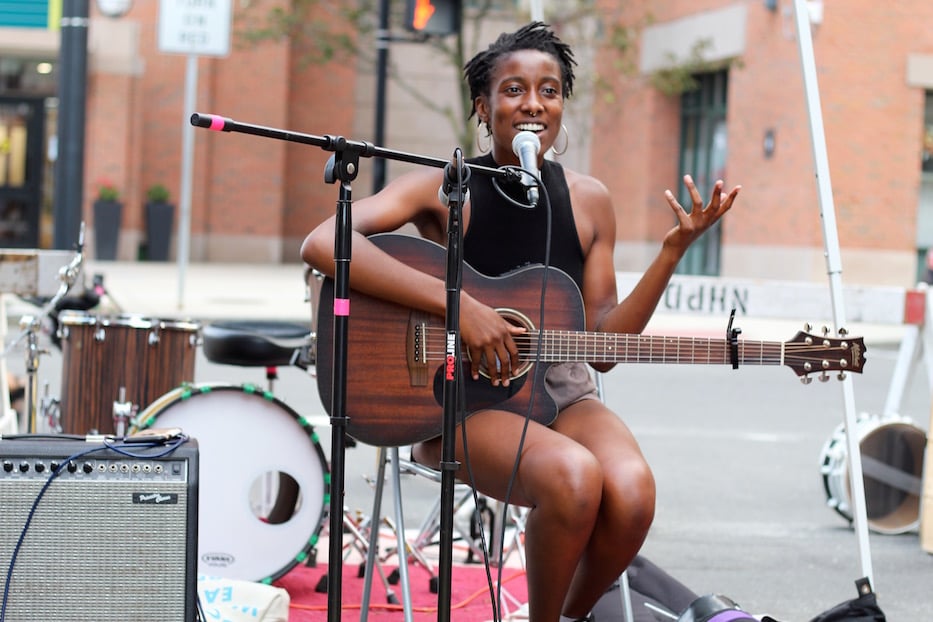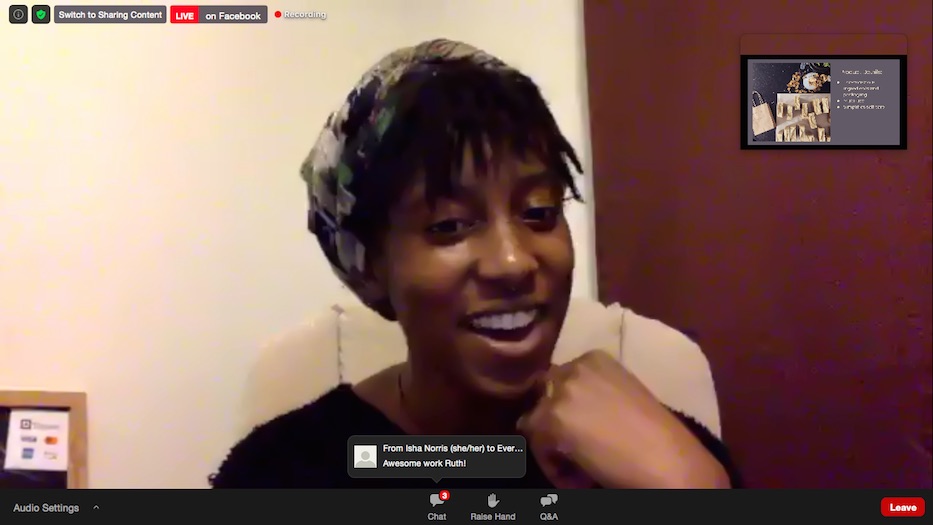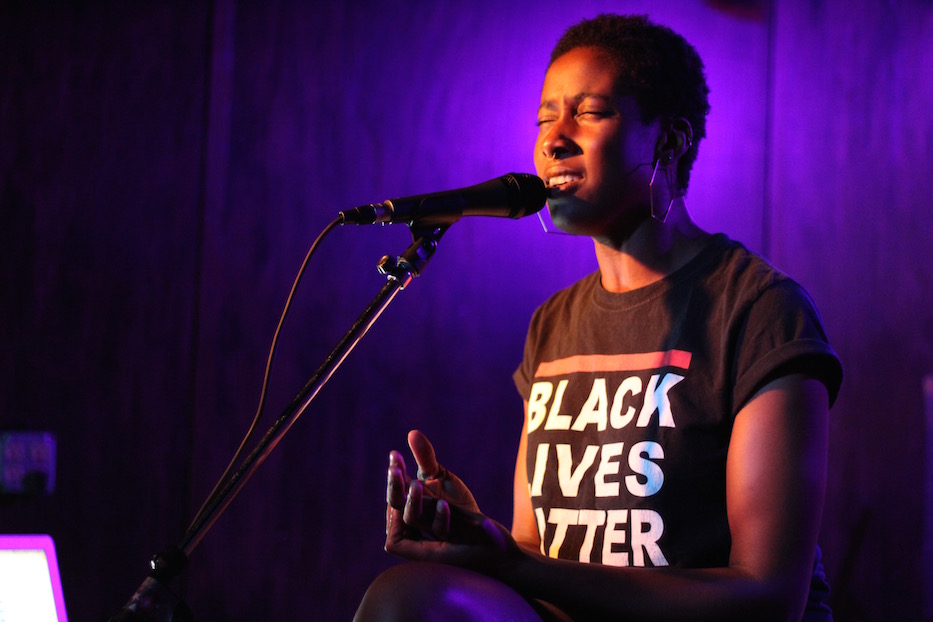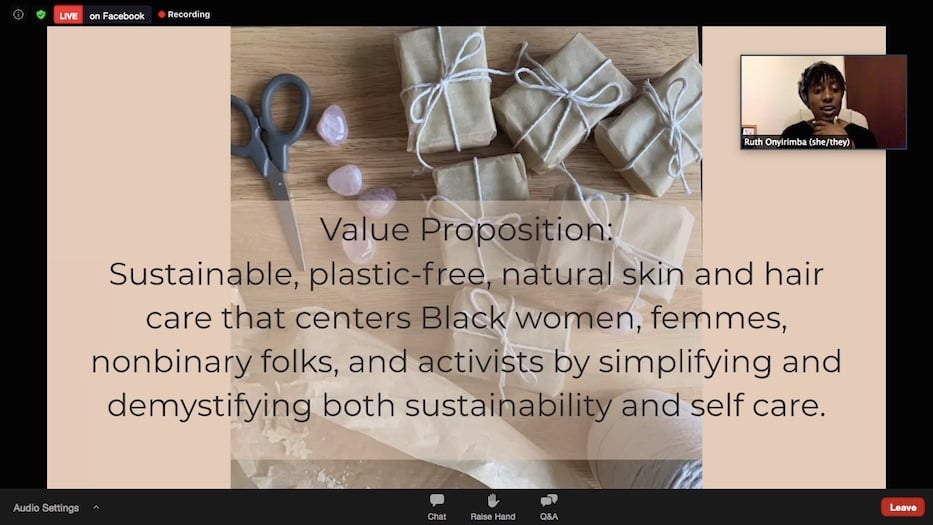
Black-owned businesses | Culture & Community | Music | Arts & Culture | COVID-19 | Arts & Anti-racism

Ro Godwynn in August of this year, at the city's inaugural Black Art Fair on Orange Street. Lucy Gellman File Photo.
Ro Godwynn began the year on a stage, her lyrics wrapping Long Wharf Theatre in sound that rose upwards, less smoke and more satin. She’s ending it by rededicating herself to the practice of self-care for Black women, femmes, nonbinary people, and activists. In between, she learned to navigate a world turned completely on its head by COVID-19, capitalism, and white supremacy.
Godwynn is a musician, creator, and the founder of rsgrdn (pronounced Ro’s Garden), a line of handmade organic soaps and salves that launched in May. This year, they have allowed her to yoke environmental sustainability and self-care with Black entrepreneurship. As she moves into 2021, she’s looking to both expand the business and its healing footprint.
“Self-care is what you do when you’re treating yourself as your first line of defense,” she said in a recent interview on Zoom. “Like, what is in my control to care for myself when there are systems in place that will not care whether I live or die?”
Godwynn’s year started brightly. Almost exactly a year ago, she and a friend closed out 2019 daydreaming about skincare products that didn’t wreck the environment and were made for women who looked like them. She started experimenting with ingredients for soapmaking (“Google will teach you anything,” she laughed) in January. Weeks later, she was part of Zulynette’s day-long event “The Vision” at Long Wharf Theatre. She was getting ready to celebrate her 25th birthday.
Even as the year crackled with possibility, she listened as reports of the novel coronavirus started appearing online and over the airwaves. By late February, they were a consistent stream. By early March, more of a flood. In New Haven, she watched as schools closed their doors and businesses shuttered. She remembered having a realization that “Covid is a really big deal.”
Less than a month later, she was so sick she thought she might die. To this day, she doesn’t know where she picked up the virus. At the time, she was working for Edge Of The Woods Market on Whalley Avenue, and wonders if she got it there, before customers and colleagues knew what kind of PPE they should be using. No one had started wearing masks yet (she said she's now something of a mask evangelist, and will go out of the way to talk about the importance of covering one's mouth and nose). The CDC was still insisting that PPE should be reserved for healthcare workers.

Godwynn in early December, at the pitch day for Collab's Fall 2020 Business Accelerator. Screenshot from Zoom.
“It was a scary time,” she recalled, estimating that she was sick for close to six weeks. “Every sensation that I probably would have felt in a normal circumstance was just replaced with pain. My head on the pillow felt painful. The space between my fingers felt painful. I could only stay awake for an hour and a half, two hours at a time. And every time I went to sleep, I was like ‘well, I guess this is it.’”
It gave her time to think about the degree to which her Blackness—and woman-ness, and queerness—have become uniquely American comorbidities. At one point, Godwynn was so sick that she called an ambulance. She recalled listening to paramedics stand around her and debate whether she was sick enough to go to the hospital or had “maybe just had a panic attack.” What got her, even in a fog of pain, was the tone with which one of the paramedics talked to her.
“I thought that every day was just going to be the last one,” she said. She watched a friend fight the virus at the same time, so sick she was temporarily hospitalized. Around her, she saw that Black people were getting sick and dying at a rate far higher than their white counterparts.
“The survivor’s guilt was crazy,” she said. “You just wonder if you’re putting enough goodness into the world, or if you’ve made enough of yourself. There are incredible people who have passed away because of Covid. Families that are literally torn apart for all of eternity because of Covid. And it’s just like, wow. How did I make the cut?”
As Godwynn recovered, the ground continued shifting beneath her feet. When she had initially gotten sick, she was in the midst of moving apartments, and recovered in a Yale sublet on which she later learned the renter was overcharging her. In the months that she overlapped with the tenant, she said she was teased for working a service industry job—even as it had her on the front lines as an essential worker.

Godwynn performing on a bill that included Thabisa and the Gentleman Brawlers in August 2019 at Cafe Nine. Lucy Gellman File Photo.
She left the apartment and couch-hopped, trying to start a business the whole time. She found a temporary place to stay with The Let Loose’s vocalist LaQruishia Gill, sleeping on a yoga mat when there wasn’t a bed. In May, she posted a photo of her soaps on Instagram. The batch was sold out in under 24 hours.
“I was like, okay, I can do this,” she recalled.
Raven Blake, co-founder of Love Fed New Haven, praised Godwynn’s work and focus on both environmental and emotional sustainability. When Godwynn initially announced rsgrdn on Instagram, Blake was one of the first "to DM her and say, like, hey, I'm gonna need some of that." Over the summer, Love Fed included several of Godwynn’s products in its weekly Community Supported Agriculture (CSA) box.
In the past year, Blake said that the initiative has made it a goal to support local entrepreneurship focused on Black joy and self-care, including rsgrdn, Pascale’s Body Care, Bronzed, The Glass Jar Natural Skincare, and Rootine Rituals. All are local businesses run by Black women and nonbinary folks.
“Ro came through the garden a couple times and helped volunteer, and is definitely an artist and a person I respect for so many reasons,” they said. “It's always refreshing to meet somebody who's not just multifaceted, but also intentional about the gifts that they want to share and how they want to be in community.”
“I felt very fortunate to share her product with the larger community through the CSA,” they continued. “When we were thinking of the CSA this year in particular, I realized that it was important to not just give people food, but to give them something special. And I realized how many entrepreneurs I was surrounded by.”
During the summer months, Godwynn struggled to find consistent housing. In October, she found a job canvassing for Democratic presidential ticket Joe Biden and Kamala Harris in Philadelphia that “looked great on paper,” she said. She secured a room in Cherry Hill, New Jersey and spent hours knocking on doors. When she wasn’t pounding the pavement, she was trying to keep up with Zoom meetings for Collab’s fall accelerator and negotiations with a New Haven landlord.
Just eight days before the election, Walter Wallace, Jr. was shot and killed by a Philadelphia police officer. Eight hours later, her supervisors expected her to go back out and canvass. In the midst of getting out the vote, she had no time to grieve the state-sanctioned loss of another Black life. Then the apartment back in New Haven fell through. She now thinks of it as a crystallizing moment in her personal and professional trajectory.
“So much happened to me on that trip,” she said. “I think this was one of the things that made it very clear that like, even if nonprofits look good on paper, they’re still entities from which you need protection.”

Godwynn's presentation at Collab's Fall 2020 pitch day earlier this month. Screenshot from Zoom.
Her village stepped up and helped her survive, she added. In a phone call home, Phat A$tronaut frontman and musician chad browne-springer encouraged her to be open about the fact that she wasn’t emotionally okay. Over a dozen of her friends and fellow artists jumped on Zoom to find her temporary housing.
They asked her what she needed “emotionally, physically, to get back to New Haven," she recalled in tears. Through Elm City Vineyard, a church that she has attended for several years, she found a temporary place to stay in Woodbridge.
“They were like, ‘how can we help you to get back home?’” she said. “I don’t know what I would do if it weren’t for the love of those people, and for the love of the people who like, listen to my music and check in with me every day. It’s something about getting kicked out that makes you feel unworthy of getting help. For those people who continue to just violently shake up that story that I’ve told myself, it means so much to me.”
Products from rsgrdn, which she has now made and sold from three different households, have been a constant in a tumultuous year (in her words, “2020 is hard, but I’m harder”). When Godwynn is making a batch of her soaps, she performs an intimate sort of alchemy. She puts on music that lifts her spirits. She tests her own products, a routine that has led to falling asleep in the shower with a particularly good batch of CBD lavender soap. She said that it’s her mission to spread self-care to those who preach it, but may not otherwise make time for it themselves.
“I’m oftentimes struck with really powerful images of people crying in the shower—not in a sad way, but in a good way,” she said. “Or people washing their faces and seeing themselves differently. And it’s just … that makes me happy. The thought of this product, each product, making things a little bit easier. Even if it’s just emotionally. Even if it’s for a little amount of time.”
The brand’s title is meant as a double entendre. rsgrdn blooms and grows with her tender supervision and care. But it is also a rose garden, a space that contains pleasure and pain in a single, bright thicket of blooms. Growing up in West Hartford, Godwynn came to love the rose garden in Elizabeth Park. To this day, she said she’s drawn in by the fact that their beauty is matched only by the perceived danger and pain of their thorns.
The business is an extension of her mission as a musician and creative, she added. While live performance is largely on hold due to COVID-19, she writes each day, a practice that she sees as meditative and reliable. Her guitar, chimdi, is a constant friend and source of support. Earlier this year, she performed at the city’s inaugural Black art fair on Orange Street, urging listeners to "keep holding on" through the bitterness of 2020.
She sees her soaps and salves as another way to spread the message of self-care. At a pitch day for Collab’s Fall 2020 accelerator in early December, she said she hopes to find more room to create products, and to collaborate with local vendors, farmers, and entrepreneurial co-conspirators.
“This is a really promising thing, and it provides that little glimmer of hope that gets me through,” she said. “I love music. I love making music, and I want to return to a stable place, physically and emotionally and psychologically to be able to do that. But I think that the thing about rsgrdn that I appreciate the most is that it allows me to serve, still, in ways that I can no longer serve as a musician. Even if I were to lose my voice tomorrow—oh, God forbid—I can still operate in what I think is my purpose. And I can do that from anywhere.”
“This is a year, and this is an experience, that we all had together,” she added. “What would it look like to meaningfully grieve together? I think that’s what I want from my community and from my audience, and all of that. I just want space and time to be like ‘I’m hurting, but I’m also here with you, holding space with you and for you.’”
Follow Ro Godwynn as @rogodwynnthefirst on Instagram or at her website. Listen to her here and support her music here.

